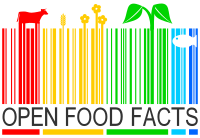Open Food Facts

Official logo
|
|
 |
|
|
Type of site
|
Collaborative database |
|---|---|
| Available in | Multilingual |
| Slogan(s) | The free food products database |
| Website | openfoodfacts |
| Commercial | No |
| Registration | Optional, but is required to contribute from web |
| Launched | 19 May 2012 |
| Current status | Operating |
|
Content license
|
Open Database Licence Database Contents License Creative Commons Attribution/Share-Alike 3.0 (product pictures) |
| Written in | Perl (Web version), Java (New Android version), Swift (New iOS version), HTML/CSS/JS (Web and current mobile version) |
Open Food Facts is a free, online and crowdsourced database of food products from around the world licensed under the Open Database License (ODBL) while its artwork —uploaded by contributors— is distributed under a Creative Commons Attribution–Share Alike license.
The project was launched on 19 May 2012 by French programmer Stéphane Gigandet during the Food Revolution Day organized by Jamie Oliver and has won the 2013 Dataconnexions Award from Etalab and the 2015 OKFN Award from Open Knowledge.
As of May 2016[update], its database contains more than 80,000 products from 141 countries.
The project gathers information and data on food products from around the world.
For each item, the database stores its generic name, quantity, type of packaging, brand, category, manufacturing or processing locations, countries and stores where the product is sold, list of ingredients, any traces (for allergies, dietary laws or any specific diet), food additives and nutritional information.
Each contributor can add or edit food items based on the information explicitly shown on the package. As a result, the barcode (when available) is generally used as the identifier. Mobile phone applications allow for capturing photos and information that are reprocessed manually by volunteers.
Due to similar mechanisms for modification, extension, or deletion of content and structure, the project is sometimes compared to in the media.
The data is reused by various projects on issues related to palm oil, sugar, and location of the producers.
...
Wikipedia
